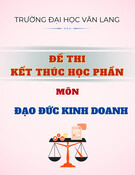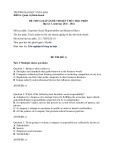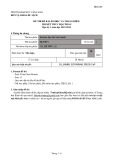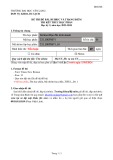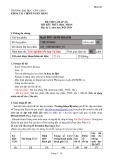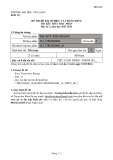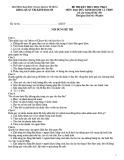
TRƯỜNG ĐẠI
HỌC VĂN
LANG
ĐỀ THI, ĐÁP ÁN KẾT THÚC HỌC PHẦN
KHOA LUẬT Học kỳ: 211 Năm học: 2021 - 2022
Mã học phần:
DTA0100 Tên học phần: Pháp luật và đạo đức KD
Mã nhóm lớp
HP:
211_7PL0011_01
211_7PL0011_02
211_7PL0011_03
Thời gian làm
bài:
75.(phút)
Hình thức thi: Tự luận
A. TRUE/FALSE QUESTIONS (5 marks)
1. S corporation can have more than 100 shareholders who is not required to be a US
citizen (2.5)
Đáp án
Trả lời Điểm
False 1.0
To qualify for S corporation status, a corporation must satisfy the
following requirements: The corporation must have no more than 100
shareholders,
0.5
all of whom must be individuals who are citizens of the United States
or U.S. resident aliens, or certain types of tax-exempt organizations,
trusts, or estates;
0.5
The corporation must have only one class of stock; The corporation
generally may not own 80 percent or more of any other corporation;
and the corporation must file a timely election to be treated as an S
corporation.
0.5
2. Stakeholder is understood as persons who invest and buy shares in a company (2.5)
Đáp án
Trả lời Điểm
False 1.0

In a business context, customers, investors and shareholders,
employees, suppliers, government agencies, communities, and many
others who have a "stake" or claim in some aspect of a company’s
products, operations, markets, industry, and outcomes are known
as stakeholders.
1.0
A person who invests and buys shares in a company should be called
as shareholders or stockholders. They can be included one of
stakeholders
0.5
B. SHORT QUESTIONS (5 marks)
1. List and explain means of dispute settlement applied in international trade and
transactions?
Đáp án
Trả lời Điểm
International law provides several possible methods for the resolution
of disputes: negotiation, good offices, mediation, inquiry, conciliation,
arbitration, and litigation.
1.0
Negotiation is a very informal process in which the goal is to reach a
compromise. Often the parties try negotiation before resorting to other
means of dispute resolution.
0.5
Good offices is a process used mainly in the area of public
international law. A third party (often a disinterested government)
brings the parties together by establishing communication and
providing a site where the parties can meet, often in secret.
Increasingly, international organizations are taking the role of the
disinterested third party.
0.5
Mediation is very similar to good offices and often is used in private
international law disputes. In mediation, the third (disinterested) party
is called the mediator and plays a more active role than the third party
in good offices. The mediator facilitates the communications of the
parties and may also intervene in a constructive way. A mediator works
to reconcile the opposing claims and to appease the feelings of
resentment that may have arisen between the parties. Like good
offices, mediation is generally non-binding.
0.75
Inquiry is done by a commission of inquiry that is established ad hoc,
often after a violation of international law. Two contending
governments review the finding of the commission with the goal of
0.5

achieving an acceptable solution to the dispute at hand.
Conciliation is a more formalized method of dispute resolution. It is
similar to inquiry but adds a "cooling-off" period. In addition, the
parties agree in advance to accept the finding of the commission.
0.5
In arbitration, a legal process is carried out by a tribunal that is often
very similar to a court. The parties must decide in advance whether the
arbitration decision will be final and binding and not subject to review
by any courts. Unless such a stipulation is made, the dispute may be
reviewed by a court without reference to the arbitration, rendering the
arbitration decision unenforceable.
0.75
Litigation, which is a legal proceeding conducted in the court system
of a state or nation, is the most structured method of dispute resolution 0.5
Ngày biên soạn: 15/10/2021
Giảng viên biên soạn đề thi: Lê Hồ Trung Hiếu
Ngày kiểm duyệt: 18/10/2021
Trưởng (Phó) Khoa/Bộ môn kiểm duyệt đề thi: Nguyễn Thị Yên
Sau khi kiểm duyệt đề thi, Trưởng (Phó) Khoa/Bộ môn gửi về Trung tâm Khảo thí qua
email: phannhatlinh@gmail.com bao gồm file word và file pdf (được đặt password cả 2
file trên) và nhắn tin password qua Số điện thoại Thầy Phan Nhất Linh (0918.01.03.09).
Khuyến khích Giảng viên biên soạn và nộp đề thi, đáp án bằng File Hot Potatoes. Trung
tâm Khảo thí gửi kèm File cài đặt và File hướng dẫn sử dụng để hỗ trợ thêm Quý Thầy
Cô.

